Sam Lipsyte recently appeared on The Bat Segundo Show #325. Mr. Lipsyte is most recently the author of The Ask.
Condition of Mr. Segundo: Looking to ask someone for something.
Author: Sam Lipsyte
Subjects Discussed: Milo Burke as the obverse to Home Land‘s Lewis Miner (and common personality qualities), Lipsyte’s early draft of The Ask getting trashed by his wife, the importance of knowing a character’s job, Stanley Elkin, descriptive dichotomies within The Ask, oscillation between extremes and forward motion in the narrative, digressive impulses, movement by painting yourself into a corner, using linguistic attributes to create distinct dialogue, the plausibility behind student housing and cages, characters who share food, the innate sadness of wraps, breast milk bars, Lipsyte’s methods of collecting information and forgetting to write details down, writing without an outline, Lipsyte’s syllabic form of internal rhyme within sentences, Lipsyte’s previous career as a lyricist, the alternative verb phrases succeeded some sentences, characters who believe that writing a book will solve everything, the purpose of writing a comic novel in a serious age, the elevator pitch motif throughout Lipsyte’s work, Lipstye’s frequent references to Old Overholt and his efforts to get a free case, “home invasion” and Lipsyte’s use of stock phrases, “closed indefinitely due to pedagogical conflicts,” the origin of “toosh dev,” on not keeping notes, the question of whether or not there are any limits to literary movements of the penis, how sequences of events assist narrative, Gordon Lish’s principle of “all the book being the good part,” Lipsyte’s present status in relation to social networks, and Lipsyte’s present relationship with weapons.
EXCERPT FROM SHOW:
 Correspondent: I wanted to ask you about your sentences. You do something extremely interesting, and this syllabic form of internal rhyme. I’ll just give you a number of examples: “a tawny teen in a cocktail dress of skimpy hemp.” “I started to rub myself and, remembering I would have to retrieve Bernie soon, recalled that I’d once done what I was doing with Bernie in the room.” So there’s the oo, oo. The book’s opening line, of course: “Horace, the office temp, was a run-down and demented pimp.” So I’m curious whether these particular sounds serve as, I suppose, reference points in your mind to get a sentence right, whether this came from your previous career as a lyricist or possibly the Gordon Lish school rubbing off now after so many books and the like.
Correspondent: I wanted to ask you about your sentences. You do something extremely interesting, and this syllabic form of internal rhyme. I’ll just give you a number of examples: “a tawny teen in a cocktail dress of skimpy hemp.” “I started to rub myself and, remembering I would have to retrieve Bernie soon, recalled that I’d once done what I was doing with Bernie in the room.” So there’s the oo, oo. The book’s opening line, of course: “Horace, the office temp, was a run-down and demented pimp.” So I’m curious whether these particular sounds serve as, I suppose, reference points in your mind to get a sentence right, whether this came from your previous career as a lyricist or possibly the Gordon Lish school rubbing off now after so many books and the like.
Lipsyte: Well, certainly, if there’s a direct rhyme there, I’d be sorry to see it. But I am interested in words that are close to each other, bouncing off of each other, colliding, creating various assonances, and such. I’m very aware of the acoustic properties of the sentences. And I listen to them. And I like to see those different elements playing off of each other. The different sounds. Just on the level of the morpheme or whatever. But, yeah, I think that I was always conscious of it. I think that studying with Gordon Lish made me understand that you could extract some power and attention to the sounds in your sentences. And I don’t know what I was doing a a lyricist, to be quite honest.
Correspondent: (laughs)
Lipsyte: I was screaming cryptic lines that couldn’t be heard because the guitars were too loud. (laughs)
Correspondent: (laughs) Maybe this was part of the syllabic quality.
Lipsyte: Yeah, exactly.
Correspondent: But I’m curious. Why syllables more so than words? I mean, there’s also, I recall reading, “Touche, douche!” There’s that as well. But more often, it’s this syllabic ride as opposed to a full word, full tilt boogie.
Lipsyte: Well, I guess that’s how I work. I mean, it’s not a conscious choice. And I think I do it in larger units as well. Or try to. And I’m very much aware. I mean, people talk about sentences. But there’s no such thing even as a great sentence. It’s about which sentences are around it. So I think that I’m trying to work on several levels.
Correspondent: I also wanted to ask about another aspect of your sentences, which is this tendency — just when you think the sentence is over, then you add a comma and a verb phrase that’s appended at the end. It’s not quite a comma splice. It’s almost a kind of alternative verb phrase. I’ll offer again some examples for folks who are listening to this. Here’s one: “Now an old man with a ducktail haircut and rolled T-shirt sleeves sauntered by” — you think the sentence is over, but no — comma, “climbed into his wine-dark bearer.” Another one: “Maura did not speak, cut her lemon chicken into rectilinear bites.” And it’s more in this book than the other two novels. And I’m curious as to how this came about.
Lipsyte: I do it as well in my book of stories probably. I just like the way it speeds up rhythm. It changes rhythm. I like the jumpiness of it. And some people say, “Why can’t you just use a fucking ‘and?'” (laughs) And sometimes I do. But sometimes I don’t.
Correspondent: Does it present an almost alternative fate in that action? Is that the idea?
Lipsyte: Yeah. Or kind of compresses time a little bit. It does a few things. And I’ve been fond of it.
Correspondent: Two characters seem to believe that writing a book will cause them to find truth, or find a lucrative career. There’s Charles Goldfarb’s book, in which he tries “to advance a new approach to transcendentalism in the face of technology and interconnectivity.” And then, of course, when Carl at the Happy Salamander tells Milo and Denise to fuck off, he announces that, “I’ll write books!” So you said in a recent interview that you don’t know what the purpose is of writing a comic novel or whether it’s going to fulfill some greater need. But it’s interesting that this reticence is shared by your characters to some degree. And I’m curious if we’re overstating the importance of books or these characters are overstating the importance of books. Or whether this is, again, just a part of the great American compromise. Being a First World bitch or what not.
Lipsyte: I’m curious about my quote. Where I said something.
Correspondent: I read the interview and, regrettably, I failed to note it down before meeting you. I read this days ago. Where you were saying that you’re not sure if the comic novel can be important in any sense. But maybe I should just ask you. (laughs)
Lipsyte; (laughs) Right.
Correspondent: Maybe I hallucinated it. I don’t think I did.
Lipsyte: Well, I’m sure what I meant to say is: I don’t know how many people can see it as important. I do. I mean, I’m not talking about my book, but, in general, I think books that have a comedic element have been the books that have fired up my imagination. No, books are incredibly important to some segment of the population. I’m not trying to say otherwise.
Correspondent: Well, these characters. Going back to them. Their insistence that books will be a vocational savior. Is this a general spitball towards Americana? Or some larger….
Lipsyte: No, I think that there’s a certain delusion about what a book can do for you, as the author. As opposed to what it might do for readers.
Correspondent: I also wanted to ask you. Because Home Land and The Ask both feature variants on the elevator pitch. You have, of course, Miner’s adventure with that white rapper in the black mink suit.
Lipsyte: Right.
Correspondent: And in this, you have Purdy’s insistence that he can deliver the most perfect elevator pitch. I’m curious how the concern for elevator pitches came about. I mean, it’s a West Coast phenomenon more than an East Coast phenomenon. So that is rather interesting.
Lipsyte: Well, I heard the phrase — maybe first in 1991 from an East Coast person. Who was kind of a businessman. So I think it’s used in all sorts of commercial pursuits. But it’s always been kind of a delightful convention to me. Because here you are in this box with a clock running, and you have to say something that’s going to make somebody else feel something. (laughs)
Correspondent: I have a very important question to ask, and that is in relation to Old Overholt. Now in Home Land, there’s that moment in which there’s the effort by Teabag to get some product placement in there, so that he can get a case of Old Overholt. Now I’m reading this. And I see Old Overholt come up twice in the book. So I’m wondering if you have reached an arrangement with the folks at Old Overholt.
Lipsyte: I’m trying to get a free case. And if it’s going to take me three books, it will be three books. (laughs)
Correspondent: Have you tried contacting them directly?
Lipsyte: No.
Correspondent: No?
Lipsyte: There are always little threads I like to pull from book to book. Just to keep me a bit amused as I work. And I like the sound of Old Overholt. It sort of opens the oral cavity in a nice way.
Correspondent: In two ways, actually.
Lipsyte: So I’m certainly happy to keep naming it until somebody at that company notices.
(Image: Mephistofales)
The Bat Segundo Show #325: Sam Lipsyte (Download MP3)


 Johnson: The Internet is in the library. Google is in the library. The librarians know how to use that. So you go to those public computers in the library. You have a librarian who can not only do Google, but who can also tell you, point you to any number of other resources that are not included in Google, or that are very difficult to get to through Google. It seems like Google is so simple. “It’s so simple even your grandmother can use it,” is the way it was described to me. Yeah, it’s brilliant for getting the quick hit on the restaurant in the Village that you want to have dinner at. There’s the address. There’s the phone number. There’s the little Google map that will get you there. But when you are actually trying to track back. When I have a clipping of a newspaper, and I’m trying to find the digital version of that, I get lost sometimes. It can’t find it. The bread crumbs don’t take you to where you know it has to be. And I’ve had librarians who have actually shown me how to wend my way through Google, which is, after all, full of redundancies, not weighted in terms of date. You need to put your heavy boots on to wade through it sometimes.
Johnson: The Internet is in the library. Google is in the library. The librarians know how to use that. So you go to those public computers in the library. You have a librarian who can not only do Google, but who can also tell you, point you to any number of other resources that are not included in Google, or that are very difficult to get to through Google. It seems like Google is so simple. “It’s so simple even your grandmother can use it,” is the way it was described to me. Yeah, it’s brilliant for getting the quick hit on the restaurant in the Village that you want to have dinner at. There’s the address. There’s the phone number. There’s the little Google map that will get you there. But when you are actually trying to track back. When I have a clipping of a newspaper, and I’m trying to find the digital version of that, I get lost sometimes. It can’t find it. The bread crumbs don’t take you to where you know it has to be. And I’ve had librarians who have actually shown me how to wend my way through Google, which is, after all, full of redundancies, not weighted in terms of date. You need to put your heavy boots on to wade through it sometimes.

 Correspondent: I wanted to go back to the hair. I had alluded to that earlier. It could just be me, but you do have a concern for hair. It’s often quite specific, as I suggested. You begin “Amber at the Window in Hurricane Season” by describing her pushing “a blond lock behind her ear, stray hairs glancing off a steel row of studs.” In “In My Heart I Am Already Gone,” you describe how Vicky “cuts her own bangs, a ragged diagonal like the torn hem of a nightgown.” In “Weekend Away,” the hitchhiker has “black, messy hair mostly covering his ears.” In “What Was Once All Yours,” Cass has hairy forearms. I’m curious about this hair. And also we haven’t alluded to the cat as well. Is it more of a protective element? You know, these characters are often barren against the elements, so to speak. And I’m curious about this. You are a hair man, I have to say.
Correspondent: I wanted to go back to the hair. I had alluded to that earlier. It could just be me, but you do have a concern for hair. It’s often quite specific, as I suggested. You begin “Amber at the Window in Hurricane Season” by describing her pushing “a blond lock behind her ear, stray hairs glancing off a steel row of studs.” In “In My Heart I Am Already Gone,” you describe how Vicky “cuts her own bangs, a ragged diagonal like the torn hem of a nightgown.” In “Weekend Away,” the hitchhiker has “black, messy hair mostly covering his ears.” In “What Was Once All Yours,” Cass has hairy forearms. I’m curious about this hair. And also we haven’t alluded to the cat as well. Is it more of a protective element? You know, these characters are often barren against the elements, so to speak. And I’m curious about this. You are a hair man, I have to say.

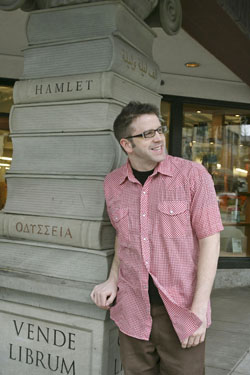 Correspondent: What was it about the radio school instructor’s body language that suggested “a few divorces in his past?”
Correspondent: What was it about the radio school instructor’s body language that suggested “a few divorces in his past?”

 Grafton: I don’t like to repel readers. I mean, we’re always dealing with homicide and violence of this sort, which is difficult enough. I don’t want to rub that in my reader’s face.
Grafton: I don’t like to repel readers. I mean, we’re always dealing with homicide and violence of this sort, which is difficult enough. I don’t want to rub that in my reader’s face.

 Correspondent: I’m curious where the punishment that Ravenel ekes out in relation to a sanitary pad came from. The idea of having to research the inner workings of a modern toilet. Was this based off of any of the interviews you did?
Correspondent: I’m curious where the punishment that Ravenel ekes out in relation to a sanitary pad came from. The idea of having to research the inner workings of a modern toilet. Was this based off of any of the interviews you did? 

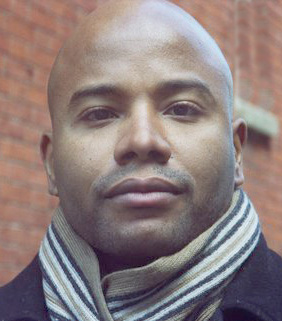 Correspondent: When Malcolm X delivered
Correspondent: When Malcolm X delivered 

 Correspondent: I wanted to ask about the many interesting aspects of candymaking that are throughout this book. Alice herself says that most candy factories have very tight security. You, I know, did some research. And I’m wondering how you managed to get many of these morsels into the actual book, and whether a lot of this is fabricated and a lot of this is speculation.
Correspondent: I wanted to ask about the many interesting aspects of candymaking that are throughout this book. Alice herself says that most candy factories have very tight security. You, I know, did some research. And I’m wondering how you managed to get many of these morsels into the actual book, and whether a lot of this is fabricated and a lot of this is speculation.

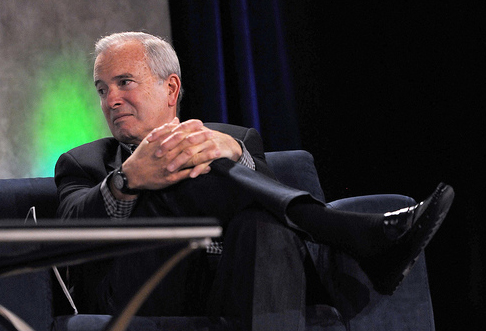 Correspondent: There’s one question that is presented in the book, but never actually quite answered. It’s probably something I just observed. And that is Google’s fixation with the number 150. They have 150 projects. They have cafeterias and conference rooms that are max 150. Did you ever get an answer as to why they were obsessed with this number? Numerologists?
Correspondent: There’s one question that is presented in the book, but never actually quite answered. It’s probably something I just observed. And that is Google’s fixation with the number 150. They have 150 projects. They have cafeterias and conference rooms that are max 150. Did you ever get an answer as to why they were obsessed with this number? Numerologists?

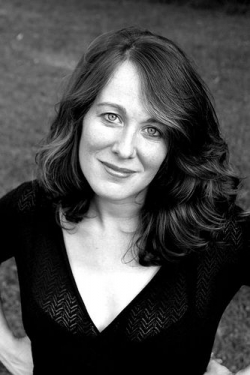 Correspondent: Henry opines that all meals should be hand-holdable and that forks and spoons should be against the law. You, again as the narrator — and this is interesting. You as the narrator.
Correspondent: Henry opines that all meals should be hand-holdable and that forks and spoons should be against the law. You, again as the narrator — and this is interesting. You as the narrator.

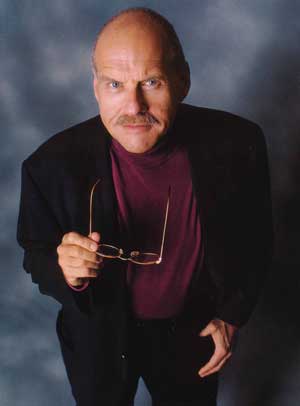 Correspondent: You mentioned that you had attempted memoir before.
Correspondent: You mentioned that you had attempted memoir before.

 Estep: “Our love of animals is directly proportionate to our indifference to human beings.” It’s a little bit of an exaggeration. I grew up around all sorts of horses and cats and dogs. To this day, my mom — if I want to get her talking to me for more than two minutes — it has to be about the dogs. So it’s an off-the-nose dialogue where we’re talking about the dogs. But really we’re talking about something else.
Estep: “Our love of animals is directly proportionate to our indifference to human beings.” It’s a little bit of an exaggeration. I grew up around all sorts of horses and cats and dogs. To this day, my mom — if I want to get her talking to me for more than two minutes — it has to be about the dogs. So it’s an off-the-nose dialogue where we’re talking about the dogs. But really we’re talking about something else. 

 Correspondent: Reading this book, I got the sense that the three Ps — pandemic, pestilence, and what’s the other one? plague! — that we’re essentially overstating them. But I want to start off by offering a hypothetical scenario. If I’m sitting at a restaurant, and a Norway rat jumps onto the table and starts nibbling at my sandwich, I’m going to have some understandable concerns. So I guess the question is, if we are in a culture of needless dread about the three Ps, what is the amount of fear that is acceptable for you? Some general terms.
Correspondent: Reading this book, I got the sense that the three Ps — pandemic, pestilence, and what’s the other one? plague! — that we’re essentially overstating them. But I want to start off by offering a hypothetical scenario. If I’m sitting at a restaurant, and a Norway rat jumps onto the table and starts nibbling at my sandwich, I’m going to have some understandable concerns. So I guess the question is, if we are in a culture of needless dread about the three Ps, what is the amount of fear that is acceptable for you? Some general terms.

 Skurnick: You know, you make up a story for what you’re trying to do later, but who knows what you were trying to do?
Skurnick: You know, you make up a story for what you’re trying to do later, but who knows what you were trying to do?



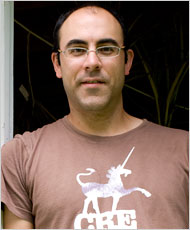 Correspondent: You seem to veer between these really lonely tales and these outright satirical tales. After the whole incident where your novel got serialized at Harper’s, I’m curious if there’s some hesitancy on your part to pursue satire. Is that why Castle‘s so dark?
Correspondent: You seem to veer between these really lonely tales and these outright satirical tales. After the whole incident where your novel got serialized at Harper’s, I’m curious if there’s some hesitancy on your part to pursue satire. Is that why Castle‘s so dark?

 Correspondent: But the writing that you did. The times that you had. Surely now, decades later, you remember those times. They matter more to you than the brand name on that sneaker. And not only that. But it seems to me that you had a situation. I had a similar situation in terms of having hand-me-downs and that kind of thing.
Correspondent: But the writing that you did. The times that you had. Surely now, decades later, you remember those times. They matter more to you than the brand name on that sneaker. And not only that. But it seems to me that you had a situation. I had a similar situation in terms of having hand-me-downs and that kind of thing.

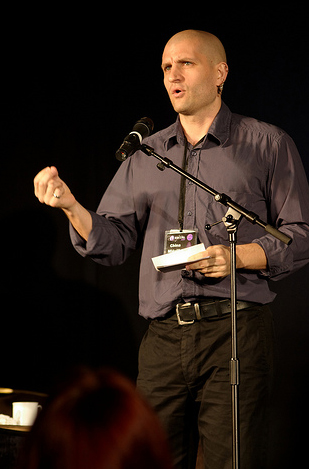 Mieville: Fundamentally, what this is about is taking the logic of everyday borders — the logic of political boundaries — and extrapolating them just a little tiny bit. But the logic is the same. It’s an exaggeration, but it’s not a radical break. So in terms of the rules of physics and all that sort of stuff, it is at least 96% sure that they are the same as in this world here. This is not a magical realm in that sense. That’s not how this works. And that’s quite a big difference. Because that short story [“Reports of Certain Events in London”] was very much about the kind of implicit dream logic of the psychogeography of London, and literalizing that metaphor and the city as an uneasy beast. This is slightly different. In some ways, this is much more to do with a genuine juridical legal reality of the world. As I said, it’s extrapolated. But to that extent, it’s very realistic. The logic of the strangeness is actually a logic that exists in the real world. It’s a little bit exaggerated, but that’s all. So to me, they feel quite different. But that’s not to invalidate your point. Because like I say, it has much to do with reception and subconscious stuff. But at a conscious level, they felt different to me.
Mieville: Fundamentally, what this is about is taking the logic of everyday borders — the logic of political boundaries — and extrapolating them just a little tiny bit. But the logic is the same. It’s an exaggeration, but it’s not a radical break. So in terms of the rules of physics and all that sort of stuff, it is at least 96% sure that they are the same as in this world here. This is not a magical realm in that sense. That’s not how this works. And that’s quite a big difference. Because that short story [“Reports of Certain Events in London”] was very much about the kind of implicit dream logic of the psychogeography of London, and literalizing that metaphor and the city as an uneasy beast. This is slightly different. In some ways, this is much more to do with a genuine juridical legal reality of the world. As I said, it’s extrapolated. But to that extent, it’s very realistic. The logic of the strangeness is actually a logic that exists in the real world. It’s a little bit exaggerated, but that’s all. So to me, they feel quite different. But that’s not to invalidate your point. Because like I say, it has much to do with reception and subconscious stuff. But at a conscious level, they felt different to me.

 Correspondent: You bring up Gresham’s law a few times in the book. That principle in which bad money drives out the good. Your example involves watered down milk over purer milk. But as you point out both in the book, with the idea of Americans having less spending money for T-shirts and lettuce, and in this particular idea that you just said in your last answer about looking for the ultimate bargain, if we have indeed become accustomed to our watered down milk, why then would we start accustomizing ourselves to purer milk? Or this higher aspect of craftsmanship? If there is no economic incentive for us to do so, then surely are we trapped in this cycle of bad money driving out the good?
Correspondent: You bring up Gresham’s law a few times in the book. That principle in which bad money drives out the good. Your example involves watered down milk over purer milk. But as you point out both in the book, with the idea of Americans having less spending money for T-shirts and lettuce, and in this particular idea that you just said in your last answer about looking for the ultimate bargain, if we have indeed become accustomed to our watered down milk, why then would we start accustomizing ourselves to purer milk? Or this higher aspect of craftsmanship? If there is no economic incentive for us to do so, then surely are we trapped in this cycle of bad money driving out the good?

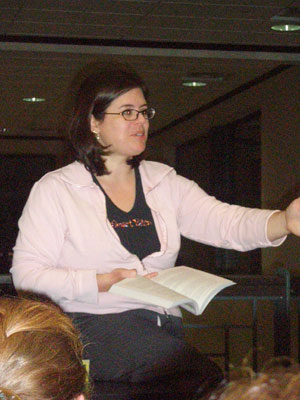 Correspondent: Science fiction, mystery, YA. These genres are getting respect, particularly in the last decade. And yet romance is still one of those things in which people thumb their noses down. Why do you think this is? Must we always have some place to go for the ghetto? What’s the deal here?
Correspondent: Science fiction, mystery, YA. These genres are getting respect, particularly in the last decade. And yet romance is still one of those things in which people thumb their noses down. Why do you think this is? Must we always have some place to go for the ghetto? What’s the deal here? Sarah Wendell: You can tell that this is something that rubbed us the wrong way.
Sarah Wendell: You can tell that this is something that rubbed us the wrong way.

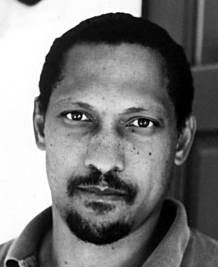 Correspondent: I recently read Richard Powers’s forthcoming novel, Generosity, which deals with the notion of what a novel really is and what ideas and characters really are. And I’m very curious to put this question to you. To what degree do you need reality to start from? And to what degree do you feel the need to be faithful to reality? Or even faithful to real-life figures? Or can you accept a Percival Everett figure in this who also happens to have a book called Erasure?
Correspondent: I recently read Richard Powers’s forthcoming novel, Generosity, which deals with the notion of what a novel really is and what ideas and characters really are. And I’m very curious to put this question to you. To what degree do you need reality to start from? And to what degree do you feel the need to be faithful to reality? Or even faithful to real-life figures? Or can you accept a Percival Everett figure in this who also happens to have a book called Erasure?

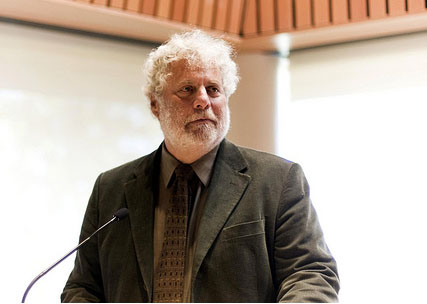 Correspondent: First off, just a general question to tie in Zola with the Federal Writers Project book. In an introduction to The Belly of Paris, you confess that, in fact, you wanted to be Zola when you grow up. And this is very interesting because Zola, of course, was a serious investigator. And, of course, going through the endnotes of The Belly of Paris, I see all these references to sausage and meat, and simultaneously I’m thinking in terms of the investigations in this book, The Food of a Younger Land. I’m curious if you think that investigation of that particular time is comparable with Zola and the Federal Writers Project and whether you think perhaps that there’s something that is missing from that type of investigation today. What are your thoughts on all this? Just to start off here.
Correspondent: First off, just a general question to tie in Zola with the Federal Writers Project book. In an introduction to The Belly of Paris, you confess that, in fact, you wanted to be Zola when you grow up. And this is very interesting because Zola, of course, was a serious investigator. And, of course, going through the endnotes of The Belly of Paris, I see all these references to sausage and meat, and simultaneously I’m thinking in terms of the investigations in this book, The Food of a Younger Land. I’m curious if you think that investigation of that particular time is comparable with Zola and the Federal Writers Project and whether you think perhaps that there’s something that is missing from that type of investigation today. What are your thoughts on all this? Just to start off here.

 Correspondent: Do you view Youssef stealing the paperweight as a financial transaction?
Correspondent: Do you view Youssef stealing the paperweight as a financial transaction?

 Correspondent: I should probably start this conversation off by confessing something to you. I think that Rachael Ray is a bit on the crazy side. She’s not someone who really makes me comfortable. I’m actually quite frightened by her. You know, I don’t find her down-to-earth at all. And I think maybe we can start off by describing how we went from this relatively benign cooking show setup, in which you had a quieter, less frenetic impulse, to this more exhibitionistic cooking show that involves a Jerry Springer-like audience shouting for the EVOO and all that. How did we get from one extreme to the other? Do you have any fundamental observation throughout the course of your meticulous observations?
Correspondent: I should probably start this conversation off by confessing something to you. I think that Rachael Ray is a bit on the crazy side. She’s not someone who really makes me comfortable. I’m actually quite frightened by her. You know, I don’t find her down-to-earth at all. And I think maybe we can start off by describing how we went from this relatively benign cooking show setup, in which you had a quieter, less frenetic impulse, to this more exhibitionistic cooking show that involves a Jerry Springer-like audience shouting for the EVOO and all that. How did we get from one extreme to the other? Do you have any fundamental observation throughout the course of your meticulous observations?

 Correspondent: I must ask then, Mara Faye, if you had read any other books to get the idiom right in English for this. Because both your translation of this book [Wonderful World] and your translation of Pandora in the Congo strike me as far more specific. It’s almost as if the translation itself can be placed within a neat, genre-specific feel in the prose. And I’m curious if you do it more intuitively or if you actually do, in fact, try and read books surrounding a particular genre or a particular place it might end up. So that it might be more palatable to the English ear.
Correspondent: I must ask then, Mara Faye, if you had read any other books to get the idiom right in English for this. Because both your translation of this book [Wonderful World] and your translation of Pandora in the Congo strike me as far more specific. It’s almost as if the translation itself can be placed within a neat, genre-specific feel in the prose. And I’m curious if you do it more intuitively or if you actually do, in fact, try and read books surrounding a particular genre or a particular place it might end up. So that it might be more palatable to the English ear.

 Correspondent: If we’re talking about time, there’s also the notion of reader’s time. And as a stylist, you have some control over how frequently or how long or how short the reader’s going to turn the page. When I read your book, I found numerous passages when I would slow down. And then when dialogue would bump up, particularly with the scenes with the cop, it then sped up.
Correspondent: If we’re talking about time, there’s also the notion of reader’s time. And as a stylist, you have some control over how frequently or how long or how short the reader’s going to turn the page. When I read your book, I found numerous passages when I would slow down. And then when dialogue would bump up, particularly with the scenes with the cop, it then sped up.

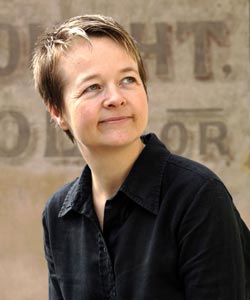 Waters: He’s about to turn forty.
Waters: He’s about to turn forty.

 Correspondent: You use the words — the modifier “seemingly liberated’ — to describe this educated Indian woman who goes and, of her own volition, says, “I want to have boys. I don’t want to have girls.” Let’s actually take this into consideration, along with the case of
Correspondent: You use the words — the modifier “seemingly liberated’ — to describe this educated Indian woman who goes and, of her own volition, says, “I want to have boys. I don’t want to have girls.” Let’s actually take this into consideration, along with the case of 

 Correspondent: You write, “In my adult life, I’ve seen that while white institutions could be unthinking, even brutal, toward black aspirations, individual whites, either through genuine friendship or political philosophy, could be crucial allies. So while I never lost sight of racism, it became a huge part of my personal development to take whites as they came, not expecting racism or prejudice from them. And even if it was there, not to overreact, but remember it and exact revenge when I could.” But isn’t revenge along the lines of a kind of negative emotion? Or a negative idea like racism? I mean…
Correspondent: You write, “In my adult life, I’ve seen that while white institutions could be unthinking, even brutal, toward black aspirations, individual whites, either through genuine friendship or political philosophy, could be crucial allies. So while I never lost sight of racism, it became a huge part of my personal development to take whites as they came, not expecting racism or prejudice from them. And even if it was there, not to overreact, but remember it and exact revenge when I could.” But isn’t revenge along the lines of a kind of negative emotion? Or a negative idea like racism? I mean…

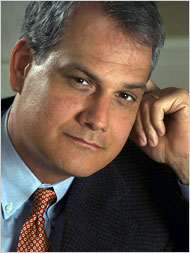 Correspondent: John Updike. He wrote a piece called
Correspondent: John Updike. He wrote a piece called